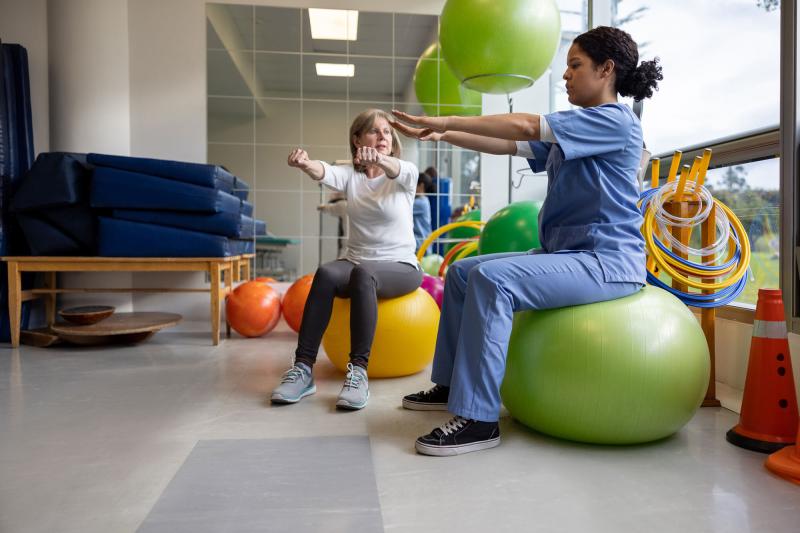- AdventHealth University

In a world where independence and autonomy are highly valued, the role of occupational therapy often remains in the shadows, quietly changing lives one small step at a time. Occupational therapists are resourceful and compassionate health professionals who work with everyone from children to the elderly, helping them overcome challenges that result from injury, illness, or aging.
But what exactly is occupational therapy, and how does it empower individuals to live fulfilling lives? Let’s take a look.
Defining Occupational Therapy
Occupational therapy, often abbreviated as OT, is a health care profession that focuses on helping people of all ages participate in the activities that matter most to them. These activities, known as "occupations," encompass all aspects of daily life, from self-care tasks like dressing and grooming to more complex roles such as work, leisure, and social interaction. The goal of an occupational therapist is to improve a person's ability to engage in these meaningful activities.
Occupational therapy empowers individuals to lead more fulfilling lives by addressing physical, emotional, cognitive, and social aspects of their well-being. Its holistic approach makes it a valuable health care profession that enhances independence, promotes recovery, and improves the overall quality of life for people facing various challenges and conditions.
A Holistic Approach
One of the distinctive features of occupational therapy is its wholistic approach to health and well-being. Unlike some other health care professions that target specific body systems or conditions, occupational therapy looks at the individual as a whole. It considers the physical, emotional, cognitive, spiritual, and social aspects of a person's life and how they intersect to influence their overall function and quality of life.
Who Can Benefit from Occupational Therapy?
Occupational therapy is a versatile discipline that serves a wide range of individuals across various age groups and settings. Here are some common types of occupational therapy:
- Pediatric Occupational Therapy: Pediatric OT focuses on helping children develop the skills needed for daily activities and participation in school and play. Therapists work with children who have developmental delays, sensory processing disorders, autism, or physical disabilities. Pediatric OT aids in children's development by addressing sensory processing, motor skills, and social interaction, ensuring they can thrive academically and socially.
- Geriatric Occupational Therapy: Geriatric OT is dedicated to supporting the aging population in maintaining independence and quality of life. OTs and OTAs help seniors adapt to age-related changes, manage chronic conditions, and enhance their ability to perform daily activities. Geriatric OT promotes independence in older adults, allowing them to maintain a higher quality of life as they face age-related challenges.
- Hand Therapy: Hand therapists specialize in treating conditions and injuries affecting the hands and upper extremities. They help individuals regain hand function after surgery, trauma, or conditions like arthritis.
- Mental Health Occupational Therapy: OTs in this field work with individuals experiencing mental health challenges such as depression, anxiety, bipolar disorder, and schizophrenia. They assist in developing coping strategies, improving emotional regulation, and enhancing daily living skills.
- Rehabilitation Occupational Therapy: In rehabilitation settings, occupational therapists aid individuals recovering from injuries, surgeries, or illnesses, such as strokes and traumatic brain injuries. Their focus is on restoring functional independence.
- Neurological Occupational Therapy: Neurological OTs specialize in working with individuals affected by neurological conditions, such as multiple sclerosis, Parkinson's disease, or cerebral palsy. They address issues related to mobility, coordination, and cognitive function.
- School-Based Occupational Therapy: OTs in school settings collaborate with educators and parents to support children with disabilities or learning challenges. They help students develop the skills necessary for academic success and participation in school activities.
- Home Health Occupational Therapy: Home health OTs provide services to individuals in their homes, addressing issues that may affect daily living, mobility, and safety in a home environment.
- Community-Based Occupational Therapy: This type of OT extends services into the community, helping individuals with disabilities or mental health concerns integrate into society by improving their social and life skills.
- Vocational Rehabilitation: Occupational therapists in vocational rehabilitation assist individuals with disabilities in preparing for and finding employment. They focus on improving job-related skills and ensuring a successful transition into the workforce.
- Burn and Wound Care Occupational Therapy: These OTs work with individuals who have suffered burn injuries or other complex wounds. They help with wound management, scar tissue management, and functional recovery.
- Oncology Occupational Therapy: OTs specializing in oncology work with cancer patients to address the physical, emotional, and practical challenges associated with cancer diagnosis and treatment.
Occupational therapists may choose to specialize in one or more of these areas based on their interests and training, ensuring that individuals receive the specialized care they need to enhance their quality of life and independence.
Required Skills
To excel as an occupational therapist, OTs should possess a diverse set of skills that encompass both clinical and interpersonal abilities. Here are the key skills required for an occupational therapist:
- Clinical Knowledge: OTs must have a strong foundation in anatomy, physiology, and psychology to understand how physical and mental health factors impact a person's ability to perform daily activities.
- Assessment Skills: The ability to conduct thorough assessments of a client's physical, cognitive, emotional, and social capabilities is essential for creating personalized intervention plans.
- Problem-Solving: Occupational therapists should excel in problem-solving to adapt interventions and strategies to meet individual client needs effectively.
- Communication: Effective communication skills are crucial for building rapport with clients, collaborating with healthcare teams, and explaining treatment plans to clients and their families.
- Patience, Empathy, and Compassion: OTs should be compassionate and empathetic, as they often work with individuals facing physical or emotional challenges. Understanding and respecting the client's perspective is vital.
- Creativity: OTs often need to devise innovative solutions to help clients overcome barriers to independence and participation in daily activities.
- Adaptability: The ability to adapt interventions and strategies to changing client needs and different clinical settings is vital.
- Time Management: Efficiently managing time is essential, as OTs often work with multiple clients and must balance administrative tasks and documentation.
- Teaching and Training: OTs frequently educate clients and their families on how to use adaptive equipment, techniques, and strategies to enhance daily living.
- Documentation: OTs must maintain detailed records of client assessments, progress, and treatment plans in compliance with health care regulations.
- Team Collaboration: Collaboration with other health care professionals, including physicians, physical therapists, and speech therapists, is essential for comprehensive patient care.
- Technological Proficiency: Familiarity with technology and assistive devices used in therapy.
These skills collectively enable occupational therapists to provide client-centered care, promote independence, and empower individuals to overcome challenges and achieve their health care goals. Continuous professional development and refinement of these skills are key to success and career satisfaction in the field of occupational therapy.
Careers in Occupational Therapy
If you are interested in a career in Occupational Therapy, AdventHealth University offers an Associate of Science in Occupational Therapy Assistant program as well as our Master of Occupational Therapy program, both of which offer hands-on clinical experience.
Recommended Readings
Sources
Occupational Therapists, Bureau of Labor Statistics, U.S. Department of Labor
Related Pages
Associate of Science in Occupational Therapy Assistant
Master of Occupational Therapy
Recent Blogs

Occupational Therapy offers relief and rehabilitation for people who struggle with daily activities because of a health condition. Here we take a look at outpatient vs inpatient occupational therapy.
...
